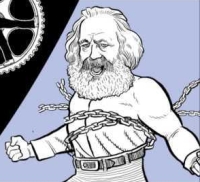History:
Karl Marx, a German Sociologist born in 1818, is well known for his theories revolving around the bourgeoisie and proletariats. His initial academic endeavours were in

philosophy, however, as he matured his focus transitioned towards political economy and the history of capitalism (Wood, 2004). Marx expresses that two men in his life had a considerable influence on his literacy and intelligence. Firstly, his father, who encouraged him to question the upper classes and secondly his neighbour, who was a Prussian government official (Berlin, 2013). These two men are what drove him to pursue the theories we all know today.
Labour theory of Value:

Karl Marx labour theory of value explores a class and struggle within a capitalist mode of production. Marx, Engels & Dean (2016) argue that under the capitalist production all value is produced by the labour force, which is made up of the middle and lower class that is trying to provide for their societies standard of living as the capitalist economy grows. Leaving the control of production in the hands of the elite class, which Marx, Engels & Dean (2016) claims is an inevitable exploitation of a social class. Yet without the labouring classes, production would not be possible. Highlighting that without this hierarchy of class within the labour force, a capitalist society would not be successful in economy growth.
Theory of Relationships:
Marx’s theory of relations between culture, social life, and economy criticises the activity of mass production, opposed to traditional society. Specific trades and instilled passion were key elements of traditional society. Marx believed that we identify ourselves as human through our work and that it creates a sense of fulfilment, pride and passion within one’s craftsmanship. However, the capitalist reality trapped and destroyed workers, as they were considered to

be nothing more than cogs in a machine and, as a result, were alienated. Alienation is a key idea for Marx (2016) as he suggests that “the alienation of the worker in his product means not only that his labour becomes an object, an external existence, but that it exists outside of him”. Further highlighting that for many workers, their labour was meaningless tasks that deprived them of any sense of accomplishment.
Theory of class struggle:
Karl Marx viewed the structure of society in relation to its major classes and the struggle between them. According to Marx, a social class occupies a fixed place in the process of production. Marx, Engels & Dean (2016) recognised two main classes of people, the Bourgeois also known as capitalists defined people who had ownership of work and land these people who were often people of importance. The Proletarians were people with no ownership of the production and were simply employed. The Politics of economic class, specifically the hierarchies, inequities and inequalities of a society is structured by class. Increasingly class conflict is manifested at the societal level his awareness that change was not random but the outcome of a conflict of interests.
How is the theory important today?
Using Marx’s theories, we are able to apply and relate to dimensions such as society, culture and economics in our daily lives. Modernity plays a major role in the way our economy and society function and Marx demonstrates the solid institutional core of modernity as the emergence of the world market, production, consumption and human needs. Modernity in the western culture has led to the development of infrastructure and the world market. Marx identifies the negative components of modern society, describing the falling apart of modern society can be seen as being alive and well. Marx believes that part of modern society is being able to adapt to and learn from change to move forward as a modern society and believes that capitalism destroys human possibilities it creates and is not ideal for a modern society.
Limitations of the theory:
A limitation to Karl Marx’s theories is his Utopian way of thought. This is due to Marx believing there is a classless and stateless society. This can be seen as a limitation as it is inevitable to have a society without class and state, therefore his theory cannot be correct (Lutz, 1979, p.131-133). As well as this, Marx also believes that state is a class institution and he tends to describe this as an instrument of violence, force and exploitation in the hands of the ‘rich’. However, according to Lutz (1979), state is described as being a natural social institution and is an instrument of welfare. In saying this, the modern welfare state is extremely pro-poor and is not a weapon of the rich to exploit the poor.
References:
Andrist, L 2015, Marx’s concept of alienation, The Sociological Cinema, viewed 6 September 2017, <http://www.thesociologicalcinema.com/videos/category/marxmarxism858841b2ca>
Berlin, I 2013, Karl Marx, Princeton University Press, New Jersey.
Berman, M 2010, ‘All that is solid melts into air: the experience of modernity’, Verso, pp. 90-98.
Lutz, M 1979, ‘The Limitations of Karl Marx’ Social Economics’, Review of Social Economy, vol.37, no.3, pp.329-344.
Marx, K, Engels, F & Dean, J 2016, ‘Manifesto of the Communist Party’, in The Communist Manifesto, Pluto Press, Chicago, pp. 47-70.
Marx, K 2016, ‘Economic and Philosophic Manuscripts of 1844’, in W Longhofer and D Winchester (eds), Social Theory Re-Wired, Taylor and Francis, New York, pp. 152-159.
Rogers, N 2015, Karl Marx and The First International, The Project: A Socialist Journal, viewed 4 September 2017, <http://www.socialistproject.org/history/karl-marx-and-the-first-international/>
Polyp, 2016, To the Poor of the World, image, Scisco Media, viewed 7 September 2017, https://sciscomedia.co.uk/understanding-marx/
Wood, A 2004, Karl Marx, Taylor & Francis, Milton Park.